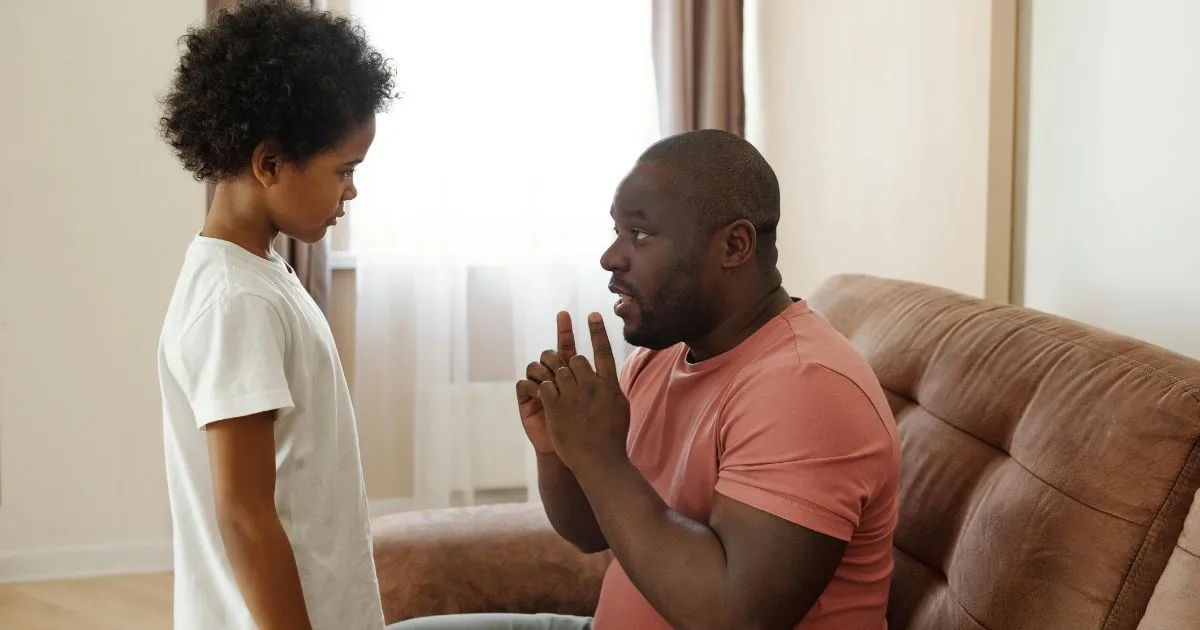The Power of Listening to Your Child
Have you ever felt like your child’s needs were ignored, even when you tried your best? In today’s fast world, it’s easy to forget how much listening to our kids matters. But what if I told you that listening with kindness can change everything?

Key Takeaways
- Discover the transformative power of deep listening in parenting
- Learn how compassionate listening can help relieve a child’s suffering and create a safe space for self-expression
- Explore strategies to strengthen the parent-child bond and foster trust through active listening
- Understand the importance of practicing deep listening, even during stressful or challenging moments
- Recognize the impact of compassionate listening on a child’s sense of being heard and valued
In this guide, we’ll explore how to communicate better with kids. We’ll share tips on understanding their views and strengthening your bond. Join us to learn how listening can deeply affect your child’s growth and happiness.
Understanding the Fundamentals of Active Listening in Parenting
Good communication is key to a strong bond between parents and kids. Active listening is a vital skill in parenting. It’s more than just hearing what’s said. It’s about really understanding what’s meant, even without words.
By learning to listen actively, parents can help their kids feel heard and understood. This strengthens their relationship and builds trust.
Different Types of Listening Styles
Not all listening is the same. Some methods, like just hearing without really paying attention, don’t meet kids’ emotional needs. Active listening, however, means being fully there for the child. It shows you care about what they think and feel.
Why Traditional Listening Methods Often Fail
When parents are distracted or always ready with advice, kids might feel ignored. This can hurt their feelings and make them less likely to talk. Active listening, though, makes kids feel safe to share their thoughts and feelings.
Core Components of Active Listening
- Suspending judgement and preconceptions
- Focusing intently on the child’s words and body language
- Reflecting back what the child has said to ensure understanding
- Asking open-ended questions to encourage deeper exploration
- Validating the child’s emotions and experiences
Learning these key parts of active listening helps parents create a space where kids feel important and respected. It lets them share their thoughts and feelings freely.
The Power of Listening to Your Child: A Transformative Approach
Listening to your child is incredibly powerful. It lets them share their feelings freely, easing their pain and helping them heal. By listening with kindness, you make your child feel valued and understood.
Tracy Morley, a mom of four, believes in trusting your gut when parenting. She learned to tell the difference between instinct and intuition. Tracy created the Time Key Method, using special techniques to help people listen to their inner voice.
Tracy’s dream was to grow and find purpose through parenting. She shows how moving from instinct to intuition makes parenting better. This shift helps parents deal with stress and make better choices.
“Effective communication enhancing parent-child relationships is a key factor highlighted for better interaction.”
By listening deeply to your child, you build a stronger bond. This lets them open up and feel safe. It leads to a better relationship and less conflict.
Listening with compassion is key to intuitive parenting. It helps create a space where children feel heard and respected. This way, they grow with confidence and strength.
Building Trust Through Compassionate Listening
Compassionate listening is key to building trust between parents and kids. It creates a safe space for kids to express themselves. This makes them feel emotionally secure and strengthens their bond with parents.
This method lets kids share their thoughts and feelings freely. They don’t worry about being judged or interrupted.
Creating a Safe Space for Expression
Families react differently to kids’ emotions. Some see it as normal, while others might not. Parents who respect emotions and create a safe space teach kids about self-expression and empathy.
Developing Emotional Security
Parents’ feelings affect how they see their kids’ behavior. Feeling tired or stressed can make them see things the wrong way. By managing their own emotions, parents help their kids feel secure.
This makes for a better relationship between parents and kids.
Strengthening Parent-Child Bonds
Authoritative parenting is good for kids. It combines being responsive with setting clear rules. This style helps kids grow up well and do well in school.
Compassionate parenting, with lots of empathy, gives kids a safe place to explore their feelings. This builds trust and strengthens the bond between parents and kids.
| Parenting Style | Characteristics | Impact on Child Development |
|---|---|---|
| Authoritative | High responsiveness, clear boundaries and expectations | Positive psychosocial competence, academic achievement |
| Compassionate | Strong empathy, safe emotional exploration | Secure attachment, positive parent-child bond |
By being compassionate and listening, parents make their kids feel heard and supported. This builds trust and emotional security. It also makes the parent-child bond stronger, which is important for kids’ healthy growth.
How Deep Listening Impacts Child Development
Deep listening is very important for a child’s growth. It helps them feel heard and understood. This boosts their emotional health, communication skills, and overall happiness.
Studies show that when kids feel heard, they grow emotionally stronger. They also do better in school. This is thanks to the University of Minnesota’s research.
A National Youth Agency survey found that many young people feel their parents don’t get their career dreams. Deep listening can change this. It makes kids feel valued and supported in their goals.
“Providing warm, responsive parenting, including active listening, makes children more likely to develop high self-esteem, perform well academically, and have strong social relationships,” as demonstrated by the University of Minnesota study.
Deep listening builds trust and makes kids feel safe. It also makes the parent-child bond stronger. When kids know their parents listen, they open up more. This deepens their relationship.
By using deep listening, parents can help their kids grow in all areas. They become more confident, resilient, and have a strong sense of self-worth.

Practical Techniques for Empathic Listening
Effective communication with children is more than just hearing their words. It’s about empathic listening. By using active listening skills, parents can build stronger bonds, handle tough talks, and help their kids develop emotional smarts.
Body Language and Non-verbal Cues
It’s key to watch a child’s body language and non-verbal signs. Look at their face, listen to their voice, and notice their body movements. This helps parents understand their feelings better. It makes a safe space for talking openly.
Responding vs. Reacting
It’s easy to react quickly in stressful moments. But empathic listening means taking a moment to think before answering. This way, parents can calm things down, show they get their child’s feelings, and solve problems together.
Managing Difficult Conversations
Talking about tough topics with kids can feel scary. But empathic listening guides the way. Stay calm and let your child share their feelings without fear of judgment. Ask open-ended questions to really get what they’re saying. This way, you can tackle hard subjects with kindness and respect.
| Empathetic Listening Skills | Benefits |
|---|---|
| Active Listening | Fosters deeper understanding and connection |
| Non-Verbal Communication | Provides insights into the child’s emotional state |
| Responding vs. Reacting | Diffuses tense situations and promotes problem-solving |
| Open-Ended Questions | Encourages children to express their thoughts and feelings |
Learning these empathic listening skills helps parents improve their active listening skills and talk more effectively with their kids. This approach builds trust, understanding, and emotional safety in their relationship.
Filling Your Child’s Emotional Buckets
As parents, we can boost our child’s self-esteem and understand their feelings. The idea of “bucket filling” is key. It shows how important it is to meet our child’s emotional needs. Think of their heart as a bucket that needs to be filled with love and positive experiences.
The bucket filling concept focuses on two main needs. The first is for positive attention, which means love and being fully present. The second is for positive control, which means feeling in charge and making choices.
- Dedicate 5-10 minutes of focused, one-on-one time with your child each day, engaging in activities they enjoy.
- Provide genuine praise and encouragement to nurture your child’s self-esteem and confidence.
- Offer physical affection, such as hugs, cuddles, and gentle touches, to help your child feel loved and secure.
- Ask open-ended questions to promote communication, creativity, and a deeper understanding of your child’s thoughts and feelings.
- Transform everyday tasks into bonding experiences, like cooking or gardening together.
By filling your child’s emotional buckets, you build trust and security. This leads to better behavior and a child who feels valued and ready to succeed.
“The greatest gifts you can give your children are the roots of responsibility and the wings of independence.” – Denis Waitley

Embracing bucket filling can deeply impact your child’s emotional growth and happiness. By focusing on their emotional needs, you strengthen your bond and prepare them for a bright future.
Overcoming Common Listening Barriers
Good communication with kids is key to a strong bond. But, many things can get in the way of really listening and connecting with them. It’s important to tackle these challenges to improve active listening skills and effective communication with children.
Dealing with Distractions
Today, distractions are everywhere. Phones, background noise, and clutter can make it hard to focus on what your child is saying. To help, make a space free from distractions. Turn off your phone, keep the noise down, and make sure the area is calm and comfy for talking.
Managing Time Constraints
It’s easy to get caught up in a busy schedule. But, making time to listen is essential. Look for small moments in the day, like during meals or before bed, for talks with your child. Try not to do other things while you’re talking and stay fully in the moment.
Breaking Old Habits
Changing how we talk and listen takes time. Notice if you often interrupt, give advice without being asked, or get lost in your own thoughts. Try new ways of listening, like repeating back what you heard, asking questions that encourage talking, and keeping eye contact. This will help you understand and connect with your child better.
By tackling these common listening barriers, you can make your child feel heard and understood. Focus on active listening skills and effective communication with children. This will help build trust, respect, and understanding in your family for a long time.
Creating Daily Opportunities for Meaningful Conversations
Building a strong bond with your child is key for their growth. One great way to do this is by having daily talks. These chats can happen during meals, car rides, or before bed.
Active listening is a powerful tool in these moments. It means really listening to your child without interrupting. This makes them feel understood and valued. It also gives you a peek into their world.
- Start Early: Begin talking about values and feelings when your child is young. This helps create a strong communication foundation.
- Be Patient: Give your child time to share their thoughts and feelings. Avoid interrupting or making assumptions.
- Avoid Judgments: Listen carefully before you respond. This prevents quick judgments that can end the conversation.
- Follow Up: Keep having these conversations to make sure you’re on the same page. This keeps the dialogue going.
- Model Behavior: Show respect and empathy in your interactions. This sets a good example for your child.
By making time for meaningful talks, you can better understand your child. This strengthens your bond and helps your child grow in many ways. These moments are crucial for their social, emotional, and mental development.
“The most important thing in communication is to hear what isn’t being said.” – Peter Drucker
| Benefits of Treating Your Child as an Equal | Description |
|---|---|
| Enhanced Communication | Children open up more when they feel respected and valued. |
| Stronger Bonds | Seeing children as equals builds deeper connections and trust. |
| Empowerment | Children who feel their opinions matter become more confident and empowered. |
| Responsibility and Accountability | Knowing their thoughts matter helps children feel responsible. |
| Mutual Respect | This approach fosters mutual respect, creating a harmonious family environment. |
Real-Life Examples and Testimonials
Maria’s son thought work was her main focus. So, she made sure to spend more time with the family.
John’s children felt more confident after he listened to them. This strengthened their bond.
Lisa’s daughter emphasized the importance of kindness and helping others. This led to meaningful family discussions.
The Role of Listening in Building Self-Esteem
As parents, we aim to boost our child’s self-esteem and confidence. Listening is key in this effort. It’s a powerful way to help your child feel valued and emotionally strong.
When your child feels heard, they know their thoughts and feelings matter. This boosts their self-esteem. By listening, you show you care and help them understand their emotions better.
Compassionate listening is more than just hearing words. It’s about being fully present and attentive. This makes your child feel seen and valued, building their confidence.
| Listening Skill | Impact on Child’s Self-Esteem |
|---|---|
| Avoiding Interruptions | Allows your child to express themselves fully, fostering a sense of being heard and understood. |
| Paraphrasing and Summarizing | Demonstrates that you have listened carefully and comprehended their message, further validating their thoughts and feelings. |
| Asking Thoughtful Questions | Conveys your genuine interest in their perspectives, making them feel valued and worthy of your attention. |
Using active listening in parenting helps your child feel safe and valued. This builds their self-worth and confidence.
“The greatest gift you can give your child is the ability to feel heard and understood.”
Listening is a powerful way to boost your child’s self-esteem. It strengthens your bond and helps them become more confident and independent. By focusing on listening, you’re investing in your child’s long-term well-being and developing child’s confidence.
Fostering Independence Through Active Listening
As parents, we aim to help our kids grow independent and confident. Active listening is a key tool in this journey. It helps our children solve problems, be more self-reliant, and strengthens our bond.
Studies show that kids who get the right support during changes do better emotionally and socially. They become more confident and flexible. Active listening is a big part of this support.
Reflection and Validation: The Keys to Unlocking Independence
Reflection is a core part of active listening. We repeat back what our kids say and feel to show we get it. This builds trust and makes them feel heard and supported.
Reflection helps kids think more clearly and solve problems better. It makes them more confident in facing challenges on their own.
Practical Strategies for Fostering Independence
- Introduce predictable routines to help children feel safe, secure, and understand expectations, reducing anxiety and building independence.
- Utilize visual schedules to provide a clear overview of the day’s activities, enabling children to anticipate and prepare for changes.
- Incorporate timers to help children transition between tasks, providing warnings and celebrating successful transitions to reinforce positive behavior.
- Offer children choices during times of transition to promote independence, decision-making skills, and a sense of control.
- Celebrate small victories and progress to boost self-esteem, encourage persistence, and help children recognize their own growth.
By using these strategies and active listening, we create a supportive space for our kids to grow. This strengthens our bond and helps our children become confident and self-assured. They are ready to face future challenges.
“Positive parenting has been taught to parents for 22 years, indicating a long-standing approach to support families in fostering independence through active listening.”
Positive parenting focuses on encouragement and constructive guidance. It improves kids’ emotional intelligence and problem-solving skills. This approach builds a strong, supportive relationship that helps kids thrive.
Conclusion
Listening to your child is incredibly powerful. It can create a strong bond, build trust, and greatly influence their growth. This approach helps you understand them better, making them feel safe and secure.
Active listening in the parent-child relationship has long-term benefits. It creates a safe space for open talks. This helps your child develop important social and emotional skills for life.
Start this journey to strengthen your bond by changing old habits. Make sure to focus on your child and have meaningful talks. This will help you build a lasting connection based on trust and understanding.
Don’t hesitate to see other articles on my bloghttps://www.skillsraisingkids.com/
FAQ
What are the key benefits of deep, compassionate listening in parenting?
Deep, compassionate listening in parenting builds trust and improves communication. It strengthens the bond between parents and children. Children feel heard and valued, which helps them grow emotionally.
How can compassionate listening create a safe environment for children to express themselves?
Compassionate listening makes children feel safe to share their feelings. They don’t worry about being judged. This builds trust and makes communication open and honest.
What are the core components of active listening, and how can parents incorporate them into their interactions with children?
Active listening means not judging and focusing on the speaker. Parents can do this by putting aside their own thoughts. They should keep eye contact and be fully present. This way, they truly understand their child.
How can deep listening contribute to a child’s self-esteem and independence?
Deep listening makes children feel valued, boosting their confidence. It also helps them develop problem-solving skills. This way, they become more independent while still feeling supported.
What are some practical strategies for overcoming common barriers to effective listening, such as distractions and time constraints?
To improve listening, parents can reduce distractions and set aside time for talks. They should also break habits that get in the way. This might mean focusing during meals or car rides. Learning to stay present in tough talks is also key.
Source Links
- Ep #172: How to Listen to Your Children So It Makes a Difference – The Peaceful Parent – https://thepeacefulparent.com/2024/04/24/compassionate-listening-children-connection/
- Fill these two buckets for better listening from your child – ParentsTogether – https://parents-together.org/fill-two-buckets-for-better-listening-from-your-child/
- Effective Communication Skills for Parents: Building Strong Connections – https://www.learningleaders.com/insights/effective-communication-skills-for-parents-building-strong-connections
- How to listen, be present, and connect deeply with your child. – https://medium.com/@themindbodymanagementco/how-to-listen-be-present-and-connect-deeply-with-your-child-5279deea1fb4
- From Selective Hearing to Active Listening – https://envisiontherapydfw.com/from-selective-hearing-to-active-listening-the-eye-contact-method/
- The Power of Intuitive Parenting: A Transformative Approach – Tracy Morley – https://globalwomanmagazine.com/intuitive-parenting/
- A Year of Listening and Learning with Children at the Center – https://www.wkkf.org/news-and-media/article/2024/03/la-june-montgomery-tabron-letter/
- Master the Art of Effective Communication to Make Your Child Listen Every Time – https://www.linkedin.com/pulse/master-art-effective-communication-make-your-child-every-ved-thaker-fv8nf
- Do You See Your Child in a Positive Perspective? – https://www.gottman.com/blog/do-you-see-your-child-in-a-positive-perspective/
- Combining Compassionate & Authoritative Parenting Styles – https://cookcenter.org/combining-compassionate-authoritative-parenting-styles/
- Kiddie Matters How To Build Trust With Students: 10 Powerful Trauma Informed Practices – https://www.kiddiematters.com/the-best-way-to-build-trust-with-kids-10-powerful-trauma-informed-practices/
- Listen Actively to Your Child – ByTrait – https://bytrait.com/2024/08/listen-actively-to-your-child/
- Active Listening: Strengthening Parent-Child Relationships – https://samsoyombo.com/developing-skills-for-listening-to-your-child/
- Empathic Listening: What It Is And How To Use It – https://www.betterup.com/blog/empathic-listening
- Empathic Listening: Definition, Examples, and Skills – https://topresume.com/career-advice/empathic-listening-definition-examples-and-skills
- Nurturing Empathy in Children: The Foundation of Emotional Intelligence — Doing Good Together™ – https://www.doinggoodtogether.org/dgt-newsletter/nurturing-empathy
- How To Fill Your Child’s Attention Bucket: Practical Tips for Parents – https://www.thatquietmom.com/attention-bucket/
- Bucket Filling; What is it and why is it so important? | TeachingBrave – https://teachingbrave.com/bucket-filling/
- Three Common Barriers to Communication with Your Teen – Sedona Sky Academy – https://www.sedonasky.org/blog/three-common-barriers-to-communication
- Barriers to Effective Listening and Strategies to Overcome Them – Oatley Vigmond Personal Injury Law Firm 1-866-269-2481 – https://oatleyvigmond.com/effective-listening/
- Are These 5 Common Communication Barriers in Parenting Holding You Back? – https://www.linkedin.com/pulse/5-common-communication-barriers-parenting-holding-you-rini-mathai-4lznc
- How to Strengthen Social Engagement in Children: 7 Tips – Basal Therapies – https://basaltherapies.com/how-to-strengthen-social-engagements-in-children
- Understanding Your Child’s Perception of Your Values | Mastery Martial Arts – https://masteryma.com/understanding-your-childs-perception-of-your-values/
- Active listening with pre-teens and teenagers – https://raisingchildren.net.au/pre-teens/communicating-relationships/communicating/active-listening
- The Power and Impact of Good Listening – https://www.psychologytoday.com/us/blog/high-octane-women/202404/the-power-and-impact-of-good-listening
- The Power of Becoming a Brilliant Listener for Your Child – https://www.topteen.in/blogs/the-power-of-becoming-a-brilliant-listener-for-your-child
- Supporting Young Children Through New Experiences – https://bbmacademy.com/blog/supporting-young-children-through-new-experiences/
- The Busy Parent’s Guide: What is Positive Parenting? – https://bekindcoaching.com/blog/what-is-positive-parenting/
- Empowering Through Reflection with Your Child: Cultivating Positive Communication and Understanding – https://samsoyombo.com/reflection-with-your-child-enhancing-communication/
- Want to Better Connect With Your Adult Child? Stop Advising – https://www.psychologytoday.com/us/blog/liking-the-child-you-love/202408/want-to-better-connect-with-your-adult-child-stop-advising
- The Power of Parental Emotional Support: Nurturing Your Child’s Well-Being – https://www.linkedin.com/pulse/power-parental-emotional-support-nurturing-your-childs-sanger-7chlc
- The Power of Showing Up: A Key to Child Development – +ProActive Approaches – https://proactiveapproaches.co.uk/the-power-of-showing-up-a-key-to-child-development/







